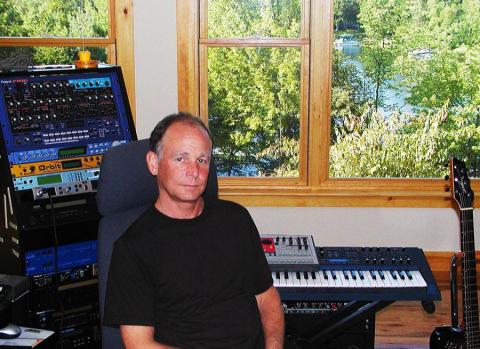Faculty Profile
Anyone with a love of music and nature would find cruising scenic Squam Lake in Holderness, New Hampshire, in a speedboat with Randy Roos at the wheel a blast. During a recent excursion with Roos, our conversation veered away from jazz, studio gear, and guitars to a discussion of the habits and habitats of bald eagles, when Roos spotted one perched high atop a tree straight ahead. Roos navigates his way to various made-for-postcard views of Squam’s myriad inlets and tiny islands as well as he negotiates the changes of a Coltrane tune on his guitar. It was last year when he realized a longtime desire to relocate to New Hampshire’s Lakes Region. The idea wasn’t to leave the life he’s led for years in the Boston area, but to find a working balance between city and country lifestyles. Roos has always had as much passion for the outdoors as he’s had for playing guitar, composing, recording, and teaching music, and his location on a hillside overlooking a cove on Squam River brings it all together.

Associate Professor Randy Roos
He commutes to Berklee to teach Introduction to Music Technology, Recording/Practice Techniques for the Performing Guitarist, a guitar effects lab, and private guitar students. (He also developed and teaches the online course Recording and Producing for Guitarists.) When not at Berklee, Roos is usually in the recording studio he built in his house. Known as Squam Sound, the studio boasts a spacious control room and two isolation rooms (one for drum tracking and the other for vocals or acoustic instruments), a computer running Logic Audio, racks of preamps and signal processing gear, and more. Roos built it to produce the music he writes for TV shows, documentaries, and his own album projects. Now that it’s complete, he’s opening it up to others who want to see what inspiration they’ll find in a rural recording environment. (Visit www.squamsound.com for pictures and specs.)
“A lot of folks pick up on a different energy here than they would get recording in a city,” Roos says. “Both vibes are good, but they are different. Sometimes getting away to a place where your mind can breathe a bit makes you think differently.” To foster that type of inspiration, Roos and his clients often break from working in the studio for an hour when the weather is warm to take his boat out on the lake or in the fall, to go for a short hike.
Roos became interested in music after hearing the Ventures when he was 10. “I was at a friend’s house, and his brother was playing his guitar along with Ventures note-perfect,” Roos recalls. “I stood outside his room totally transfixed.” By the time he was in middle school, Roos had begun experimenting with two tape recorders to make a sound-on-sound recording of his guitar playing. That was long before multitrack machines were on the market.
During the summer between his junior and senior years of high school, Roos attended Berklee’s summer program. That’s when he first studied with Mick Goodrick, who opened his eyes to music in a new way. “That summer program totally blew my mind,” says Roos. “I was doing some unusual things on guitar before that, but after Mick taught me his modal approach and I got introduced to jazz, I decided I had to be a musician. Now when I teach at Berklee’s Summer Guitar Sessions, I tell my young students that I hope something they learn there will be for them like the epiphany I had that summer.”
In the 1970s, Roos was becoming widely regarded as a fast-rising young guitarist to watch. The groups he played with always packed the clubs. One such band, Orchestra Luna, with its successful blend of rock, jazz, Broadway, and performance art, brought Roos the opportunity to record for a major record label. Some A&R people from Epic Records came to hear Luna and signed the group. “We’d managed to blow their minds at our gig,” says Roos. “The next thing we knew, we were in the studio with a huge album budget. Everyone was pleased with the album, but just two weeks after it was released, all of the people we were working with left Epic, and the new people had no interest in us. The momentum ended, and the whole thing just fizzled.”
Roos enrolled at Berklee for a year in 1978 and soon began playing with guitarists Mike Stern ’75 and Bill Frisell ’77; bassists Neil Stubenhaus ’75, Kermit Driscoll ’78, and Victor Bailey ’80; keyboardist Steve Hunt ’80; and drummer Tommy Campbell ’79, among others. He has since released critically hailed independent albums, three discs for the Narada label, and two with percussionist George Jinda.
Throughout his career, Roos had maintained simple home studios, but sensed in 1986 the dawn of a new era when he realized the possibilities of MIDI sequencing. “In my studio, I had a few synthesizers, a computer, and an eight-track recorder,” he says. “I started feeling I could do anything with that setup!” Wanting badly to write music to picture, he volunteered to compose for an industrial video. The client loved his music, and since that initial success, Roos has written lots of postproduction music. Composing music for nearly 150 episodes of PBS programs, such as Scientific American Frontiers and Nova, has been a perfect fit for Roos. “That work has been great because it connects the areas I love most: music, science, and the natural world.”
At Squam Sound, Roos continues his specialty of masterfully blending and manipulating electronic sounds with live and acoustic tracks, always producing musically compelling results. As much as he loves his studio’s environment, he admits that sometimes the view out the window is so alluring that he has to close the curtains so he’ll stay inside and work.




